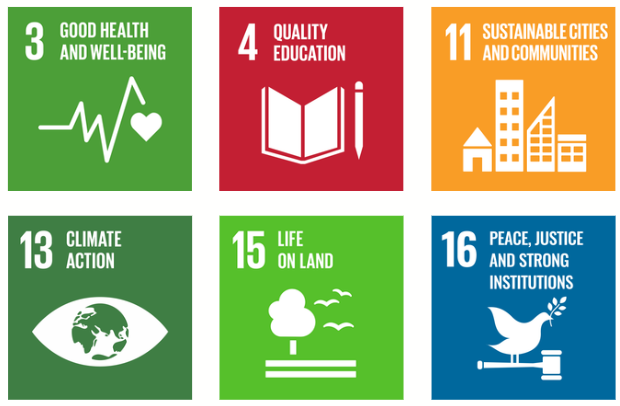What we do as an organisation
Our work aims to support the United Nations Sustainable Development Goals (SDGs), which address the economic, social, and environmental challenges of our planet. In our daily work we commit to these goals:

Organisational work
IBG adopts the self-declaration of Bergwaldprojekt on climate-friendly behavior! What does that mean? We want to do something about climate change and commit to the following three points in our daily work:
- We renounce domestic flights and flights for travel up to 1'000 km.
- We minimize our energy consumption in the office and use power from 100% green electricity.
- We renounce meat from conventional, industrial production and use, as far as possible, only biological, seasonal and regional or fair food in our trainings and events.
Trainings & Travel reimbursements
What and how we consume food has a direct and indirect impact on the climate, on our natural environment, and on all other living beings. This is why at our trainings and seminars we usually provide vegetarian or vegan meals and hope to inspire to a more conscious consumption. Here you can find 7 reasons why, for example, we aim to eat less meat.
We do not reimburse travel costs for domestic flights and travel costs for cars only up to an amount of 150 Euros. For train bookings, we can reimburse you also for the costs of a CO₂ offset.
Many volunteers travel medium or long distances to reach their Workcamp. We recommend that all participants think about offsetting the CO₂ emissions of their trip and choose the most environmentally friendly means of transport. Here you can calculate the CO₂ emissions of your trip to the workcamp with different means of transport.
Traveling more sustainably doesn't just mean choosing environmentally friendly means of transport. It also means paying attention to social justice, respecting foreign cultures and keeping the negative impact of your trip on the environment as small as possible. Here are a few tips to make your trip as sustainable as possible.
In an international group in particular, it is often exciting to discuss the topic of sustainability and to get to know different approaches to solving the climate crisis from various regions of the world. We motivate all group leaders of our work camps to choose a motto for their camp. This means, for example, trying to do without plastic, reducing waste, buying fair coffee, etc. Read more about how to choose your camp's motto.
Become an IBG-Eco-Messenger!
Is the topic of sustainability important to you? Would you like to get further involved further? We are looking forward to your participation! You can support us in various ways:
Become an Eco-Messenger!
As an Eco-Messenger, you visit a Workcamp and give a small input on a topic of sustainability or climate- and nature protection; for example on water, diet, mobility, upcycling, shopping etc. We will refund your travel costs as well as help you with the planning and implementation of your workshop!
More Info
Want to read more about sustainability? Here you will find some articles about how we practise sustainability in our workcamps, while travelling and with our daily office work.